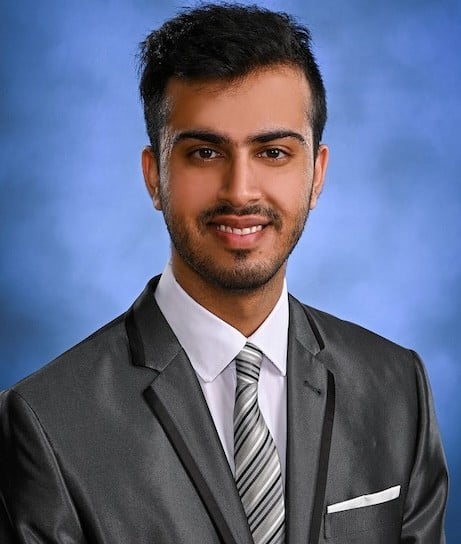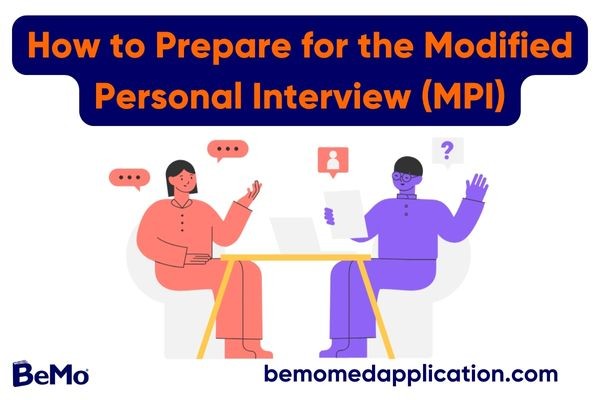The Modified Personal Interview (MPI), a unique interview format used by the University of Toronto Medical School, is the final hurdle in your journey to being accepted. Beyond test scores and grades, the MPI is your opportunity to showcase that you have the qualities that define a compassionate and capable physician-in-training. Our guide dives deep into the MPI format, providing insights, sample questions, and actionable tips to help you excel in this pivotal interview.
>>Want us to help you get accepted? Schedule a free initial consultation here <<
Listen to the blog!
What is the Modified Personal Interview (MPI)?
The Modified Personal Interview (MPI) is not your typical medical school interview. While traditional formats may focus heavily on academic achievements, the MPI takes a different route. This conversational-style interview emphasizes personal attributes and non-cognitive skills essential for effective medical practice—such as empathy, ethical decision-making, communication, and teamwork—similar to what the CASPer test evaluates.
Why Does the University of Toronto Medical School Use the MPI?
The University of Toronto (U of T) uses the Modified Personal Interview (MPI) and its virtual adaptation (vMPI) to overcome the shortcomings of traditional med school interviews and Multiple Mini Interviews (MMIs) commonly used by other medical schools in the US and Canada.
Currently, the University of Toronto medical school is the only medical school in Canada using this interview format.
Traditional interviews, while simple and cost-effective, lack reliability in predicting a candidate's personal characteristics. MMIs, though reliable, are expensive and resource-intensive due to the multiple independent sampling approach. The MPI combines these approaches and involves four interviewers, allowing for a comprehensive evaluation from diverse perspectives. This setup enhances the MPI's reliability and validity while maintaining cost-effectiveness and fostering meaningful interactions between candidates and interviewers.
Prepare with these common medical school interview questions!
How Does the MPI Differ From Other Medical School Interview Formats?
Modified Personal Interview (MPI) vs. Multiple Mini Interview (MMI)
Some applicants mistakenly assume that the MPI is similar to the MMI used by other Canadian medical schools. However, the MPI focuses on candidates' personal experiences and backgrounds to assess their suitability for medical school, contrasting with the MMI's scenario-based approach. Unlike MMI questions, where candidates prepare before entering the interview room with a prompt or scenario, MPI questions are encountered during the interview.
Modified Personal Interview (MPI) vs. Panel Interviews
In contrast to panel interviews, where candidates face a group of interviewers who ask questions sequentially, the MPI involves four separate interviews, each with a different interviewer. This format allows for a more in-depth assessment of candidates' abilities, providing a holistic view of their suitability for medical practice beyond academic qualifications.
How To Prepare for the MPI: Structure, Sections, Scoring, and Tips
Preparing for the MPI is a little different than other medical school interview prep, and it is worth it to devote time and effort to this particular format if you have applied to medical school at U of T. One former BeMo Student did just that and found that the preparation paid off on interview day.
“For my third session with Sarah, we practiced the MPI interview format and it was a huge help in getting ready for the actual interview format. Come interview day, having run through a realistic simulation of the MPI and getting constructive feedback, I was much more comfortable during the actual MPI.” – Enoch, Former BeMo Student
The Modified Personal Interview (MPI) structure, sections, and scoring assess candidates on four key clusters of attributes, activities, and achievements.
MPI Structure
The MPI structure consists of four separate interviews, each evaluated by a different interviewer, including physicians, medical students, residents, health professionals, and community members. Interviewers have reviewed the candidate’s application materials and can ask personalized questions. Each interview lasts about 12 minutes.
More recently, U of T introduced the virtual MPI (vMPI). This format also involves four separate interviews, each assessed by different raters. Candidates complete these interviews asynchronously, recording video responses of about 5 minutes each. Candidates are given one hour to complete and submit the interviews.
MPI Sections
The aim of the MPI sections is to select students whom the admissions committee believes will make the most empathetic and highly skilled physicians by focusing on the following four clusters based on the CanMEDS roles:
MPI Scoring
Each interviewer grades the applicant on a five-point scale per station, allowing a maximum MPI score of 20 points.
Sample Modified Personal Interview (MPI) Questions
Here are some sample Modified Personal Interview (MPI) questions to help you get a sense of what to expect:
- Describe a time when you faced a significant challenge and how you persevered to overcome it.
- Can you provide an example of a situation where you had to lead a team through a complex project?
- Tell us about a time when you advocated for a cause or individual and the impact of your efforts.
- Discuss a research project you have been involved in and its significance to the field.
Be ready to answer ethical questions in a medical school interview, too!
Tips to Ace the Modified Personal Interview (MPI)
Preparation is essential to acing the Modified Personal Interview because, even though it feels like a casual conversation, being well-prepared helps you anticipate questions and draft responses that highlight your strengths. Here are actionable tips to help you shine:
- Study the Format: Familiarize yourself with the MPI structure and the CanMEDS roles it evaluates, and practice responding to sample questions.
- Reflect on Experiences: Prepare anecdotes that demonstrate your personal attributes and how they align with the school’s desired qualities. Focus on experiences that highlight your maturity, reliability, perseverance, and responsibility.
- Practice: Hone your ability to communicate clearly and empathetically in different scenarios. Mock interviews are a highly effective way to improve your interview skills.
- Develop Ethical Reasoning: Familiarize yourself with ethical dilemmas in healthcare and practice applying ethical frameworks.
- Stay Calm and Confident: On interview day, stay composed, listen attentively, and respond thoughtfully while demonstrating professionalism and empathy. Whether you are doing an in-person or video interview, plan to wear an outfit that you feel confident in!
A former BeMo student used these tips and the skills they learned during a few one-on-one sessions, and the results were very successful!
“I had two mock interviews + expert feedback with BeMo experts. I appreciated how they knew the ins and outs of different interview formats, including the MPI. Both experts I interviewed with were very knowledgeable, helpful, and kind. I was accepted into University of Toronto's Medical program which was my number one choice!” – Former BeMo Student
FAQs
1. WHAT IS THE PURPOSE OF THE MODIFIED PERSONAL INTERVIEW (MPI) AT U OF T MEDICAL SCHOOL?
The MPI evaluates candidates based on their personal attributes and non-cognitive skills, assessing their potential to succeed as compassionate healthcare providers.
2. HOW SHOULD I PREPARE FOR AN MPI INTERVIEW?
Prepare by understanding the MPI format, reflecting on personal experiences, practicing communication skills, and developing ethical reasoning abilities. Although the University of Toronto medical school doesn't require CASPer, you can effectively prepare using CASPer test prep strategies, since they evaluate the same attributes.
3. WHAT TYPES OF QUESTIONS ARE ASKED IN AN MPI INTERVIEW?
MPI interview questions may include scenarios on ethical dilemmas, teamwork challenges, patient communication, and personal motivation for pursuing medicine.
4. HOW ARE MPI INTERVIEWS SCORED AT U OF T?
MPI interviews are scored by trained assessors based on predefined criteria related to professionalism, empathy, communication effectiveness, ethical decision-making, and more.
5. HOW CAN I DEMONSTRATE EMPATHY DURING AN MPI INTERVIEW?
Show empathy by actively listening to interviewers, acknowledging diverse perspectives, and demonstrating understanding and concern for others' experiences.
6. CAN I PREPARE FOR MPI INTERVIEWS WITH PRACTICE SESSIONS?
Yes, participating in mock MPI interviews or role-playing scenarios can help you practice responding to typical MPI questions and refine your interview skills. Consider working with a medical school interview expert to take your interview skills from unremarkable to unforgettable.
7. HOW IMPORTANT ARE PERSONAL STORIES AND EXAMPLES IN MPI INTERVIEWS?
Personal anecdotes and examples that demonstrate your values, experiences, and suitability for medical practice are crucial in conveying your qualifications and readiness for a career in medicine.
8. HOW DOES THE VIRTUAL MPI (VMPI) DIFFER FROM THE TRADITIONAL MPI?
The vMPI consists of four asynchronous video interviews assessed by different raters, while the traditional MPI involves in-person interviews.

